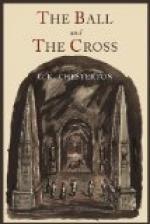On that fantastic fringe of the Gaelic land where he walked as a boy, the cliffs were as fantastic as the clouds. Heaven seemed to humble itself and come closer to the earth. The common paths of his little village began to climb quite suddenly and seemed resolved to go to heaven. The sky seemed to fall down towards the hills; the hills took hold upon the sky. In the sumptuous sunset of gold and purple and peacock green cloudlets and islets were the same. Evan lived like a man walking on a borderland, the borderland between this world and another. Like so many men and nations who grow up with nature and the common things, he understood the supernatural before he understood the natural. He had looked at dim angels standing knee-deep in the grass before he had looked at the grass. He knew that Our Lady’s robes were blue before he knew the wild roses round her feet were red. The deeper his memory plunged into the dark house of childhood the nearer and nearer he came to the things that cannot be named. All through his life he thought of the daylight world as a sort of divine debris, the broken remainder of his first vision. The skies and mountains were the splendid off-scourings of another place. The stars were lost jewels of the Queen. Our Lady had gone and left the stars by accident.
His private tradition was equally wild and unworldly. His great-grandfather had been cut down at Culloden, certain in his last instant that God would restore the King. His grandfather, then a boy of ten, had taken the terrible claymore from the hand of the dead and hung it up in his house, burnishing it and sharpening it for sixty years, to be ready for the next rebellion. His father, the youngest son and the last left alive, had refused to attend on Queen Victoria in Scotland. And Evan himself had been of one piece with his progenitors; and was not dead with them, but alive in the twentieth century. He was not in the least the pathetic Jacobite of whom we read, left behind by a final advance of all things. He was, in his own fancy, a conspirator, fierce and up to date. In the long, dark afternoons of the Highland winter, he plotted and fumed in the dark. He drew plans of the capture of London on the desolate sand of Arisaig.
When he came up to capture London, it was not with an army of white cockades, but with a stick and a satchel. London overawed him a little, not because he thought it grand or even terrible, but because it bewildered him; it was not the Golden City or even hell; it was Limbo. He had one shock of sentiment, when he turned that wonderful corner of Fleet Street and saw St. Paul’s sitting in the sky.
“Ah,” he said, after a long pause, “that sort of thing was built under the Stuarts!” Then with a sour grin he asked himself what was the corresponding monument of the Brunswicks and the Protestant Constitution. After some warning, he selected a sky-sign of some pill.




